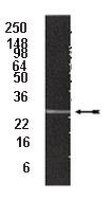04-039 Sigma-AldrichAnti-20S proteasome subunit α2 Antibody, clone MCP21
Anti-20S proteasome subunit α2 Antibody, clone MCP21 detects level of 20S proteasome subunit α2 & has been published & validated for use in IP, WB, IH.
More>> Anti-20S proteasome subunit α2 Antibody, clone MCP21 detects level of 20S proteasome subunit α2 & has been published & validated for use in IP, WB, IH. Less<<Recommended Products
Overview
| Replacement Information |
|---|
Key Spec Table
| Species Reactivity | Key Applications | Host | Format | Antibody Type |
|---|---|---|---|---|
| B, H, Rb | IP, WB, IHC | M | Purified | Monoclonal Antibody |
| Description | |
|---|---|
| Catalogue Number | 04-039 |
| Brand Family | Upstate |
| Trade Name |
|
| Description | Anti-20S proteasome subunit α2 Antibody, clone MCP21 |
| Alternate Names |
|
| References |
|---|
| Product Information | |
|---|---|
| Format | Purified |
| Presentation | 100 µL concentration of 1mg/mL purified ascites in PBS containing 0.01M sodium azide. Dilute to working strength with phosphate buffered saline pH 7.2-7.4. |
| Quality Level | MQ100 |
| Physicochemical Information |
|---|
| Dimensions |
|---|
| Materials Information |
|---|
| Toxicological Information |
|---|
| Safety Information according to GHS |
|---|
| Safety Information |
|---|
| Storage and Shipping Information | |
|---|---|
| Storage Conditions | Stable for 1 year at -20°C from date of shipment for up to 12 months. |
| Packaging Information | |
|---|---|
| Material Size | 100 µL |
| Transport Information |
|---|
| Supplemental Information |
|---|
| Specifications |
|---|
| Global Trade Item Number | |
|---|---|
| Catalogue Number | GTIN |
| 04-039 | 04053252335501 |
Documentation
Anti-20S proteasome subunit α2 Antibody, clone MCP21 MSDS
| Title |
|---|
Anti-20S proteasome subunit α2 Antibody, clone MCP21 Certificates of Analysis
References
| Reference overview | Pub Med ID |
|---|---|
| Impact of ageing on proteasome structure and function in human lymphocytes Carrard, Geraldine, et al Int J Biochem Cell Biol, 35:728-39 (2003) 2003 | 12672464
 |
| Degradation of transcription factor RFX5 during the inhibition of both constitutive and interferon gamma-inducible major histocompatibility complex class I expression in chlamydia-infected cells Zhong, G, et al J Exp Med, 191:1525-34 (2000) 2000 | 10790427
 |
| Human proteasomes analysed with monoclonal antibodies Hendil, K B, et al Biochem J, 305 ( Pt 1):245-52 (1995) 1995 | 7826336
 |














